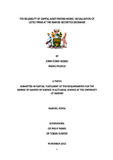| dc.description.abstract | One of the most important modern financial theories that has dominated capital markets and influenced the field of finance and business for over the past five decades is the Capital Asset Pricing Model. However, due to its empirical shortcomings several researchers have attempted to improve CAPM and its assumptions by advancing various extensions of the model. The objective of this study was to conduct empirical tests of CAPM and its extensions on the Nairobi Securities Exchange and determine other applications of CAPM in insurance. Using decade-long data from forty seven listed companies we undertake the weekly study from January 2004 – December 2013.
We find that CAPM is not fully supported by the empirical data. Alphas for a majority of the NSE stocks are significantly different from zero whereas all the betas were significant as expected. The Security Market Line was linear and a positive correlation was observed between beta and returns but the SML intercept was significantly different from zero.
The study was extended to predict ex-ante beta using CAPM for year 2014 and compare with the realized ex-post beta during the year. The test assumes mean reversion of returns and reveals high forecast errors which negate CAPM as a true predictor of ex-ante betas. Zero-Beta CAPM indicated a much lower correlation and was forthwith rejected at the NSE. On the other hand, the Fama-French Three Factor Model reveals a higher correlation with NSE but also failed crucial compatibility tests.
The CAPM is therefore not a robust tool to predict the NSE and other model extensions need to be tested for conformity with the Kenyan market. Additional tests can help eliminate errors caused by unrealistic assumptions such as lack of wealth consumption, foreign investment, varying beta and risk premia. In case these extensions fail, then CAPM can be wholly rejected as a model of asset pricing at the NSE.
Key Words: Capital Asset Pricing Model, Nairobi Securities Exchange, Systematic risk, Non-Systematic risk | en_US |



